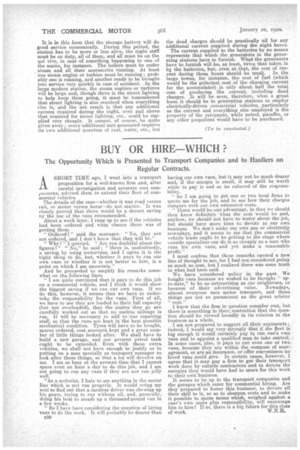BUY OR HIRE-WHICH?
Page 18

If you've noticed an error in this article please click here to report it so we can fix it.
The Opportunity Which is Presented to Transport Companies and to Hauliers on Regular Contracts.
ASHORT TIME ago, I went into a transport proposition for a well-known firm and, after careful investigation and accurate cost comparisons, advised them to extend their fleet of commercial vehicles.
The details of the case—whether it was road versus rail, or motor versus horse—do not matter. It was clearly proved that there would be a decent saving by the use of the vans recommended.
About a week later, I rang up to see if the vehicles had been ordered and what chance there was of getting them. " Ordered? " said the manager. "No, they are not ordered, and I don't know that they will be." "Why 3 "I queried. "Are you doubtful about the figureS1 ' " Is4 o," he said ; " there is, undoubtedly, a saving by using motorvans, and I agree it, is the fright thing to do, but, whether it pays to run our own vans or whether it is not better to hire, is a point on which I am uncertain."
And he proceeded to amplify his remarks somewhat on the following lines. "I am quite convinced that it pays to do this job on a commercial vehicle, and I think it would show the biggest saving if we ran our own vans. If we do this, however, it means that we have to undertake the responsibility for the vans. First of all, we have to see they are loaded to their full capacity (but not overloaded), that the routes they go are carefully worked out so that no useless mileage is run. It will be necessary to add to our repairing staff, so that the vans, are kept in the best possible mechanical condition. Tyres will have to be bought, spares ordered, cost accountS kept and a great number of little things looked after. We shall have to build a new garage, and our present petrol tank ought to be extended. Even with these extra vehicles, we shall not have enough to justify us in putting on a man specially as transport manager to look after these things, so that a lot will devolve on me. I am so busy at the present time that I cannot spare even an hour a day to do this job, and 1 am not going to run any vans if they are not run jolly well.
"As a motorist, I hate to see anything in the motor line which is not run properly. It would wring my soul to find out that a careless driver was chewing up his gears, trying to run without oil, and, generally, doing his best to smash up a thousand-pound van in a few weeks.
"So I have been considering the question of hiring vans to do the work. It will probably be dearer than 030
having our own vans, but it may not be much dearer rand, if the margin is small, it may still be worth while to pay it and so be relieved of the responsibility.
" 6o I am going to get one or two local firms to quote me for the job, and to see how their charges compare with our own estimated costs. "There would be one advantage, in that we should then know definitely what the cost would be and, anyhow, we should not have to worry about the job, but should have more time to devote te our own business. We don't make our own gas or electricity nowadays, and it seems to me that the commercial vehicle trade ought to be getting to the stage where outside specialists can do it as cheaply as a man who runs his own vans; and yet make a reasonable profit."
1 must confess that these remarks, opened a new line of thought to me; for I had not considered policy so much as cost, but I realized there was some truth in what had been said.
We have considered policy in the past. We bought vans because we wished to be thought " upto-date," to be as enterprising as our neighbours, or because of their advertising value. Nowadays, almost everyone uses motor transport, and these things are not so paramount as the great arbiter " cost."
I know that the firm in question consider cost, but there is something in their, contention that the question should be viewed broadly in its relation to the business as a whole.
I am not prepared to support all their arguments ; indeed, I would say very strongly that if the fleet is big enough it would certainly pay te rim one's own vans and to appoint a qualified man. to take control. In some cases, also, it pays to run even one or two vans, because they are within the compass of management, or are an insurance, or offer convenience no hired vans could give. In certain cases, however, I agree that it may pay a firm to get their transport work done by outside contractors and to devote the energies they would have had to spare for this work to their own business.
It seems to be up to the transport companies and the garages which cater for commercial hiring. Are they prepared to foster this business, to devote all their skill to it, so as to cheapen costs and to make it possible to quote terms which, weighed against a user's own costs plus responsibility, will encourage him to hire 3 If so, there is a big future for this class
of work. W.N.H.




























